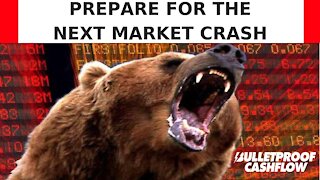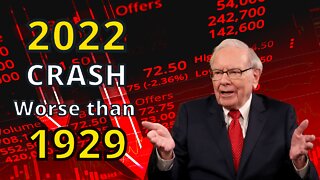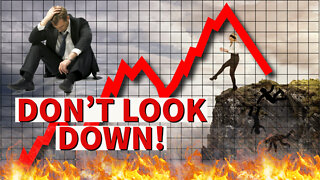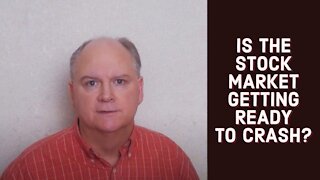How to profit from the coming market crash 2022
How to Become Rich during The Coming Market Crash 2022
Who would benefit from a major financial crisis? Certainly people and institutions with political power like , Congresses and parliaments, government bureaucrats and bureaucracies, and heads of state. To the extent that is true ,and the dynamics are more complex than the statement indicates. What are their incentives for preventing financial crises? If you're looking for names, I remember there were quite a few public instances of people who did benefit. Big names like John Paulson's bet against the subprime mortgages earned him a few billion. Bill Gross's PIMCO fund did great. I would also venture that various investment banks like Goldman also made out well. They supposedly packaged these subprime mortgages as low risk, selling them to investors, then turning around and shorting them. These same banks as well as some insurance companies also sold credit default contracts. Since the US fed eventually bought all these toxic derivatives off their books. I'd say they all made out swimmingly. Imagine if I sold billions of options over the years with a low probability of a payout. But when I actually had to pay out, and I didn't have enough money for it, the government just steps in and forks over the money for me! A very sweet deal if I do say so myself. Anyway, basically anyone who sold stocks, MBS, commodities, and all their assorted derivatives at or around 2007 benefited. Anyone on the sell-side, which makes money on volume, benefited. Anyone who bought treasuries also benefited. What did they do with all that money? Whatever they want. Welcome to The Atlantis Report. The 2008–09 financial crisis saw markets collapse, erasing trillions of dollars of wealth worldwide. Savvy investors acknowledged an extraordinary buying chance, with many companies' shares for sale at a huge discount. With markets recuperating from the Great Recession, these investors have achieved enormous profits from their aggressive tactics. Most of us can remember the moment of the collapse of Lehman Brothers. Let’s look at what has happened in the last 11 years: Real interest rates have gone to negative in most countries. You now lose money putting it in the bank. Markets have hit record highs; almost doubled since 2008 and 3.5 times from 2009 lows, now that the Dow hit 28,000. Real wages have struggled to keep up with inflation in most developed countries. So the biggest winners of 2008–2009 were calm, buy, and hold investors. The losers were those that panicked. Not in year 1. I imagine some of those buy and hold investors were feeling worried when the Dow was at 7,300 in 2009, and people who kept money in the bank felt smug. However, if you look at any financial crisis, the buy and hold investor has never, ever, regretted doing that and buying more as markets fall. On average, markets corrections typically last only a few months or a year: In the case of 2008–2009, it took three years. Occasionally, 7–10 years. That is an opportunity for the buy and hold investor to “stack up” on more units at lower prices. Almost like seeing your flights to your holiday resort on special offer, only you know that stacking up on this investment will pay off financially long-term. Those people that try to directly profit from crashes, like speculating on certain stocks going bust by shorting, usually don’t benefit long-term. A good friend of mine bought many bank stocks in 2008 after he realized the government wouldn't allow them to go bust. At one stage, he was on a huge profit, as they bounced from the lows. Long-term, however, he would have been better off just being in the index, as the prices of almost all banks have never recovered. Take HSBC as just one example of many. It went up sharply, but long-term performance has been bad. Although the advice to buy when there's blood in the streets has been imputed to more than one rich investor, it is a sound approach to creating substantial wealth. Other oft-quoted citations whose true origins are debated are that the market can stay irrational longer than you can stay solvent.
-
 23:41
23:41
miguelvees
1 year agoBIG MARKET CRASH 😱 COMING...HERE IS WHY AND WHAT YOU CAN DO!
21 -
 4:28
4:28
bulletproofcashflow
3 years ago $0.05 earnedPreparing for the Next Market Crash
621 -
 10:20
10:20
Meet Kevin Archive Channel
1 year agoMarket Crash
3 -
 23:37
23:37
TradingFraternityRumble
2 years agoTHE STOCK MARKET IS GOING TO CRASH?!
43 -
 6:42
6:42
StupidRichFinance
1 year agoWhy the 2022 Market Crash will be worse than 1929
9 -
 16:32
16:32
Bluprint Quantitative Strategies
1 year agoWill The Market Crash? ...On The Edge of a Cliff...
18 -
 10:52
10:52
Meet Kevin Archive Channel
1 year agoDo THIS before the market Collapses
1 -
 12:08
12:08
The SPX Investing Program
2 years ago $0.02 earnedIs the Stock Market Getting Ready to Crash?
109 -
 14:57
14:57
We Profit with Stock Curry
1 year agoTHURSDAY MARKET CRASH COMING - TAKE PROFITS WEDNESDAY - Wednesday, July 27, 2022
2.4K13 -
 8:43
8:43
WielandTrades
1 year agoSTOCK MARKET CRASHING! Bank Collapse! WE PROFIT!